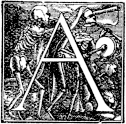 fter two weeks, the yelling had stopped. The fight had settled into a low, slow radioactive cloud. Meals were taken in silence. Eye contact, when made, left third degree burns. Obscenities, no longer spoken, were still telegraphed by the banging of doors, the rolling of eyes. They no longer slept. Sleep was for the dead and the forgiven. The original insult went unremembered. A careless word. A missed date. It didn’t matter. The event had only been a money laundering operation for the real crime: their hearts were broken. The days mounted. The fight was a kidney stone that would not pass. The pressure built like the marshalling of infantry at the borders, until one Saturday morning at the breakfast table, someone sighed at an ill-advised moment. Offense was taken. Violence seemed imminent. At that precise moment, their front door was kicked in and a pantheon of garishly coloured bears entered the kitchen. Small bears, walking upright. Their stomachs were painted with strange symbols, like gang tattoos. She screamed, he shrieked. They ran through the house, tossing chairs and bookshelves behind them, scrambling upstairs. But the bears pursued them relentlessly. They cowered on the bed, together, as the knob rotated one way and back the other and the door swung inward slowly, whining on hinges. The bears filled the doorway. They seemed to glow, like the phosphorescence of deep underground caves and unspoken things. They thrust their distended bellies forward and beams of light exploded from them, washing over the two people on the bed. Burning their clothes, ruffling the sheets. When they awoke hours later, naked and entangled, they were alone. The house was quiet. He pulled her close, she burrowed up under his chin. They were so close. Like the universe before the bang. Waiting to drift.
0 Comments
 e was thinking about better days when the mower bucked in his hands and died, down at the far end of the big lawn, where the brush was stalking in, reclaiming territory. He pulled off the red sweatshirt he wore for yard work and gave the cord a pull. The engine coughed, the blade spun once and then stuck on something. There was the cry of a bird or a child. He looked toward the house. Nothing on fire. He needed to replace those shingles. And the siding. And a new coat of stain on the deck. Inside, the kids would be playing with their toys. Making believe, she called it. Making a mess was all he saw. They were old enough to start taking on responsibilities. He gave the lawnmower a kick. Life was not all skipping and tra-la-la. He pushed. He pushed some more. But it wouldn’t move. Mired in the deep. She’d have a field day with this. She’d told him he’d let the grass get too long. He strained. He struggled. He leaned into the mower with sisyphean commitment and quixotic tenacity. He just wanted the best for them, that was all. Wanted more for them than head in the clouds, feet in the shit. He flirted with strokes, coronaries and aneurysms. He pushed and with a final tearing sound, the mower moved a few inches. On the ground where it had been were the scattered chunks of red spotted mushrooms. Maybe some kind of fungus in the sod he’d laid down last fall. He’d bought it cheap off a shifty looking fellow with an ugly cat and a penchant for black cloaks. Always cutting corners, she said. He went down on one knee, searching through the grass. The shreds of some white fabric, like a tiny pair of pants from one of the kids’ dolls. He looked back at the lawnmower. Where the bag bulged, there was a dark liquid seeping onto the grass, staining it the colour of midnight and old dreams and ocean and blue, blue, blue. He’d clean the mess up quick. They wouldn’t have to see. 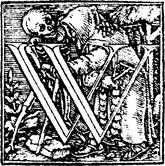 ell you know my name is, he started, but he didn’t know what came next. Simon, the nurse said. Nice to meet you, he said. No, she said, That’s your name you old fart. It didn’t sound familiar to him, but who was he to argue. He reached into the pocket of his bathrobe and pulled out a fistful of busted chalk. Give me that, the nurse said, and left him with nothing. Well. There were only whiteboards now anyway. Nothing to draw on. No way to leave an impression. He took off his glasses and closed his eyes and imagined the darkness was just one long scroll of blackboard. He could draw anything on it. Only he didn’t know what. So he drew nothing and rolled the scroll back up tight instead. Someone was tugging at his robe. He opened his eyes. A little boy, a brat. Somebody’s grandchild in for a visit. Somebody looking apologetically his way, pulling the little boy off. He turned to look out the window at the old garden wall. The wood was falling to rot, but there was a workman out there on a ladder slopping white paint on it. As if that layer of skin could hold back the years. What are you doing staring at that old thing, the nurse said, There’s nothing over it but a junkyard. I’m hot, he said. You’re nothing of the kind, she said. But she still jammed a mop handle under the door to prop it open. When she focused her torment on someone else, he snuck out into the lane. The workman was doing a piss poor job of it. What’s on the other side, he said, and the workman said, Nothing but an old junkyard. And he continued on with his piss poor job. Then he said, I need to piss, and went inside. There were eleven steps, each one an odyssey. The ladder creaked and so did his bones. When he reached the top, he wasn’t tall enough to see over. He grabbed the top boards, his hands sticking to the paint, and stretched. What can you see, a voice said. He looked back down. The brat, the little boy, was there at the bottom of the ladder. Nothing, he said. Oh, the little boy said. He kicked at the weeds in between the flagstones. It wouldn’t be long before he would be tall enough to look over his own garden walls at all the junkyards of the world. Not nothing, he said, turning back again. And then the blackboard scroll inside him unrolled, roaring with colour and laughter and magic. All of everything. Dipping his tongue into the words and painting. And the little boy listened, letting the pictures take him, take him over.  eep in the miserable ruins outside Caledon, three figures in purple robes gather around a fire. The wood, like them, is rotten and gives little light and less warmth. A bird pirouettes on a spit, green feathers piled nearby. They are all cold and lacking in animation. One of them has a beard, one wears a helmet and one is a woman. Other than that, they are indistinguishable. They speak with one voice. They’ve long since given up on money, glory and power. World domination. Now they just have the simple dream of the downtrodden: that tomorrow will be a little better, bring a little more than yesterday. Just enough to scratch some kind of lasting imprint on the world. Leave something behind them when they go. The man in the helmet claims to be invincible, and so have they all felt once. But their robes are frayed, the deep plum fading to mulberry. The bird won’t feed them all, but it will keep them going. The end might never come. But even now, from the trees there’s a toot-toot-twee! The piping of some mad flautist. The pattering of hooves. Someone shrieks in a high pitched voice: Suffering psyche! I found them, I found them! Soon he’ll be there, barely clothed. Down from the mountain with hades to pay. He’ll let them smack him around for a while. Allow them this fleeting taste of victory, before snatching it away. Then on with the ring and the crash of lightning. He’ll grab a handful of purple robes and drag one of them off, back up the mountain. Screaming. The other two will wait their turn. They’ll eat the bird. The whole thing will take less than five minutes.  ook—the moon. A small bowl brimming with cream. Listen—can you hear it? A piano, the keys softly walked. Stars rippling across the sky in time. Pull back. A sleeping, steepled town. Further. The street winding empty like it seldom does these days. Further. The buildings huddle close, the trees closer still. A handful of lights behind shuttered windows, like glowworms in cocoons. Listen—a viola slides in, easing us…off…to…sleep. But look—up there. Over the hedge. The high window of the nearest rowhouse. Push back the branch of the gnarled chestnut. That dappled glow. But before you can reach it, the light snaps off. The music hushes. Get a little closer. Closer still, hands and nose pressed coldly to windowpane. A captain’s bed. Sheets drawn tight like a death shroud over the sleeping form. Breath gusting through the empty chambers of his body. Let him sleep. But he’s just been pretending. Waiting for the wadded comfort of night to settle over us like cotton batting. A plumed head emerges from under the bed. A sheepdog, a torch clamped firmly in its mouth. The boy slides from the bed, taking the torch. Offering received. They pause, like this, in anticipation. The music hangs. The arms of some great scale sway drunkenly above us. The torch winks on. A splash of light, a circle on carpet. It glitters, like the barely remembered stars from long ago, outside. A portal. It seems to beckon. One step and we’ll be falling, straight through the floor, sliding helter skelter round and round, down and down, exploding into a world of colour and light. Old friends, new adventures. But listen—there’s no music. Just a siren in the distance. And look—in the harsh glow of the flashlight, you see it’s not a sheepdog. Just a mutt. Not a boy, a man, bent with age and disappointment. They’ve been looking for intruders. Not adventure. This is a bad neighbourhood, after all. They play the light of the torch across the wall. Shadows like slow monsters. Duck—before you’re seen. Back over the hedge, out of the light. Up and down the streets, fumbling for something, someone you might recognize.  e didn’t notice the change. It’s hard when you’re together every day. It had been too gradual, like the air leaking from a balloon after a party. One day all that’s left is a wrinkled bit of rubber you find under the chesterfield. But balloons were not cats. Cats could live fifteen, twenty years. It was a long time. He calls again for breakfast. It used to be that he was the one woken up every morning. But there’s no pounding down the stairs now. No meowing banter. He doesn’t bother with the bagged food anymore. Instead, he makes the cat’s favourite, hoping the smell will lure it down to eat. To shit. To make it through a few more hours before falling back to sleep again. Day after day being stretched like some old piece of leather. You never know when it’s going to rip. He used to make it from scratch. Nature’s most perfect food. Peel and seed the tomatoes, boil down the sauce. He’d buy the noodles at the little grocer’s up the way. An old Italian widow rolled them by hand. The store was gone now. They’d plopped something big and cold and mean on top of it. Maybe crushed the widow, too. So, now he bought the frozen stuff. Microwavable, but he doesn’t have a microwave. It took twenty minutes in the oven. Tasted like gym socks. But it was easy. And he could watch TV while it cooked. He hitches his belt in another loop. He doesn’t eat so much himself these days. He’s too scared to ask why. He’d lost the dog last year. The car hadn’t even stopped. He dug a hole in the backyard and the work nearly killed him, too. But one of the neighbours called the city on him. An officer showed up, lights and everything. You can’t do that anymore, the officer said, They got cemeteries for that now. After he’d gone, he lit a bonfire and tried to cremate the dog. The officer came back, followed by a fire truck. The whole street was lit up like Christmas. They wouldn’t let you have fires anymore, either. He climbs the stairs with the pan in his hand. It takes him a while and he has to lean on the wall a few times to catch his breath. He’s not the spry bachelor he used to be. Just another old, lonely man. He stands in the doorway, looks at the cat sleeping. The little wooden box and the blue baby blanket. Half of it spills onto the floor into a furry puddle. Fat, the veterinarian said. But he just thought of it as big. He sets the pan on the floor and pulls his pants up again. The cat opens its eyes, too tired to even yawn. He’ll feed it by hand if he has to. It keeps on growing and here he is, wasting away. They were disappearing in different directions.  he kicks through wet leaves. Orange and red, dying and dead. The streets are empty. All the children, their laughter and their shouts, are safely tucked away for another year. Butterscotch wrappers scattered in the gutters are all that remain. She follows the pools of lamplight, jumping in and out of darkness, like she has for most of her life. Nobody rang the bell again this year. Here, she climbs the wooden fence. Paint flaking, boards leaning like old men trying to catch their breath. She can’t hop it like she used to, barely breaking stride. She gets one leg over and her coat catches on a scab of wood. She gives it a yank, the seam tears and she lands on her ass in the dirt of the field. Nothing’s been sown here but weeds for the last twenty years and even those aren’t doing so well these days. There’d been some sort of run-off from the factory. Folks just bought their pumpkins from the supermarket nowadays. She finds him here at the far end of the field. Stretched out on the earth, his ratty blue blanket tucked under his head. His skin glows in the moonlight. So pale, you almost don’t notice the grey in his hair. His face looks so relaxed in sleep without all the tremors or tics. She plays with the torn seam on her coat. New this year, but now as ruined as anything she owns. Just like him. The neighbourhood kids have their jokes. If his failure weren’t so sincere, she’d laugh too. Coming out here, year after year. He’ll freeze to death if she doesn’t bring him home. She pulls the edge of the blanket up to cover her brother as best she can. They have a long walk ahead. But for now she’ll let him sleep. The disappointment of tomorrow could wait a while longer.  t’s like hitting puberty. Everyone around him blossoms into his or her true self: tall, cool, beautiful. All that potential that’s been boiling inside just explodes. Transforms them. That guy gets to be a Trans Am, that chick is a fully-loaded pink convertible, even the weird smelly dude who sounds like a throat cancer survivor gets to be a giant tape-deck. Ten years ago it would have been lame, but retro is in again. Sure, there are all those foreign exchange students that nobody talks to, but at least they get to become dinosaurs. Giant, world destroying lizards. And then, or course, there’s the big guy. The one they all look up to, crowding around to tune into that deep sexy baritone. He gets to turn into an 18-wheeler. It’s hard not to feel inadequate. It’s all about the touch, the power. Everyone’s got it. Everyone, except for him. He never got his growth spurt. His acne won't let go. So, he lurks in his mother’s basement, playing Tunnels & Trolls and dreaming about bigger things. High-speed jets and tanks and construction vehicles and he gets to turn into a microscope. Like something from a lab. He can’t even move. He has to nag and whine until one of the dump trucks comes and picks him up. It’s enough to just make you want to turn grey.  hen she opens the door her uncle is there. “Your doorbell’s broken,” he says, like it hasn’t been more than five years since the last time she saw him. “I don’t have a doorbell." “You really should get that looked at,” he says, pushing past her. She suddenly remembers the dishes piled everywhere, the laundry on the floor, the stains on the carpet. And then she remembers it isn’t the kind of thing he’d notice anyway. It’s all too obvious. He stands in her front hallway, hands behind his back, bouncing on his toes. Wrapped in his grey trenchcoat like he hasn’t aged a day. It’s all so familiar that she reaches up to tug on her pigtails, before realizing she hacked them off years ago. “How’s retirement?”She’s surprised the words come out as an attack. He looks at her, as if the words she’s said have no meaning. “I’m always on duty.” Then he points at a photograph on the wall. “That man looks just like me.” It was a picture of all of them with the Chief back when they were all working together. “That is you.” “Don’t you think I know who I am?” He harrumphs a bit, trying to figure out if he should be offended. There are pale shapes on the wallpaper where other frames had lived for years. The photos and degrees and awards, fellowships and doctorates. She’s torn it all down, one at a time. Like some kind of striptease of memory. This was the last thing left. One photograph. She doesn’t have the heart to take it down. He’s still staring at the photo. “You were brilliant.” And his tone’s so soft she can’t quite be sure he’s talking about himself, or her. “I’ll make some tea.” “I can’t stay,” he says, wheeling toward the door and heading back outside. She chases him down the front walk, weeds poking out from between the flagstones. Even now, as an adult, she has a tough time keeping up with his long strides. The minivan is parked on the lawn. The red paint trim looks hopelessly dated, but at least it matches the rust spots. He’s rammed through her mailbox, a pile of flyers and magazines sprayed out over the lawn like a flock of dead birds. He goes around to the trunk of the van. He starts fumbling through pockets. “Where did I put my—?” “I’m sorry I never called,” she says, feeling guilty and angry at her guilt at the same time. He’s on his hands and knees searching in the grass. “I just…” And she leaves it there. I just didn’t think you’d notice. And he doesn’t. He never did. “Go go keychain!” he says, jumping to his feet and jabbing one finger in the air. They both wait several long moments. Nothing happens. He kicks the bumper and the trunk opens with a puff of air. Inside is an orange shape. Fur. Long ears. Stretched out stiff. There’s not even a smell. It takes her a moment to recognize it. “He won’t wake up,” her uncle says. Not it. Him. “No.” “You were brilliant,” he says, turning to her. His words are so sincere this time, they sound like they’re welling up from her own mangled heart. You were. She sits down on the lawn. He turns back to the dog. “Maybe you can wake him?” “No.” She lies back in the grass, so long she almost disappears. “Wowsers,” he says, bouncing on his toes again. “He must be really tired.” She nods. The smell of earth. They’d bury him here. She just needs to rest awhile first. 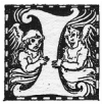 t always had the feeling of a party. A masquerade, even. The others gathered around him in the common room, listening for hours. His stories were like taffy, stretched out richly over afternoons and early evenings. Even the nurses would be caught, pen between teeth, leaning in to hear. Sure, they giggled to each other in the staff room after, but in the moment, they were all like babes pulled up next to fire. They called him Doc. Not as a joke, this place and all, but because of that particular way he had of looking at all of you at once. Like he’d just discovered you over the rim of those half-moon spectacles of his. And his stories were something else. He’d tell them about talking badgers and walking houses and flying trees. Spotted camels living on clouds. Emerald islands, lands made of terrible horrendous rock, Amazonian rivers, and underground empires. Unbelievable things. But something else. Sometimes he talked about the rocket ship he built. Dreamy Boom Boom, he called it. Then he’d grow sad. Outer Space, he’d say with a tear running down his cheek, There’s a rainbow up there a million dreams long. Once he got started on it, he’d spend the next while just staring out the window. You got the sense that he was biding his time. But he always perked up eventually. Those comets, he’d laugh, Were the rudest I’ve ever come across. He’d always finish with the last of that dappled sunlight. Looking up, as the fluorescents winked on, as if he’d been interrupted. He’d pick up that umbrella he kept by his chair and rub the handle, carved like the head of a duck, gently, like an old friend. And he’d bounce off down the hall to his room. Right there, at the end. Click and the door would be shut. There’d be a moment. Like the head of pin wedged into the silence. A moment where they all might believe. And the weight of what that belief could mean. Then the pin pops and the room breathed out. They looked at one another in that harsh light. Nervous smiles all around. It made their own problems seem trivial. The nurses would roll their eyes and start doling out the evening's pills. Harmless, sure, but what a nutter. Did you see the way he talked to that umbrella. Like it could hear. What a nutter. King of the fools. The scene was always like the end of the masquerade. When the masks come off and we’re never sure where we left our true faces. Then one morning, he’s gone. Just like that. His room, empty. The window open, curtains fluttering in the breeze. They find his sketchbook on the table, flipped open to a page. A drawing of a round barrel, a door cut in its side, with a cast iron pot for an engine and Doc’s elegant scrawl along the bottom. Dreamy Boom Boom. They found someone else to laugh at after that. They always do. |
8bitmythsRemember when you were a minipop, and you saw that film, you know, the one you loved that never had a sequel? Well, let's say it did. And it was just like you imagined it, only a little bit worse.
|
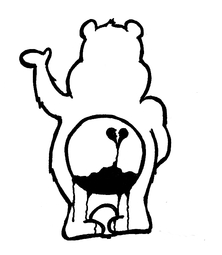
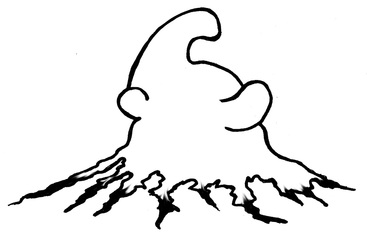
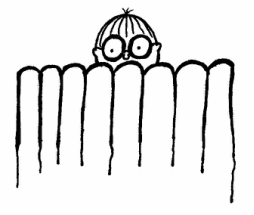
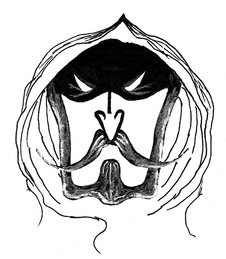
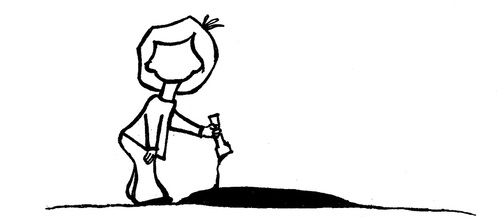
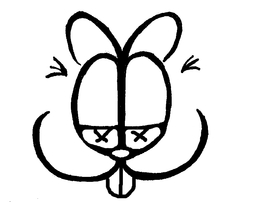
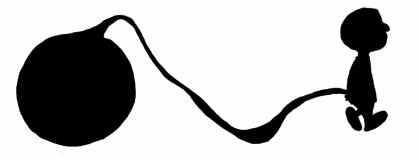



 RSS Feed
RSS Feed